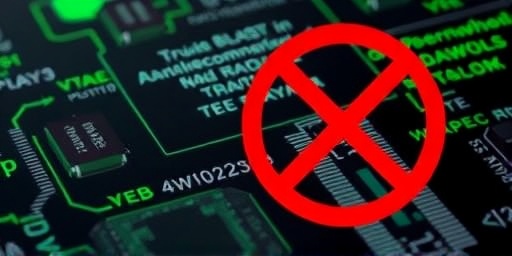In a bold move to safeguard American technological supremacy, President Donald Trump has directed the U.S. Department of Commerce to restrict exports of Nvidia‘s cutting-edge Blackwell AI chips, ensuring they are available exclusively to domestic companies. This policy shift, announced during a White House briefing on national security and innovation, underscores the Trump administration’s aggressive stance on technology policy amid escalating global rivalries, particularly with China.
The decision targets Nvidia‘s Blackwell platform, the latest generation of AI semiconductors designed to accelerate artificial intelligence development with unprecedented efficiency. Officials cited concerns over the rapid proliferation of advanced AI chips that could empower foreign adversaries in military and economic domains. ‘We cannot allow our greatest innovations to fuel the ambitions of those who seek to undermine us,’ Trump stated in his remarks, emphasizing the need to keep AI leadership firmly in U.S. hands.
This restriction comes at a pivotal moment for the AI industry, where Nvidia has dominated the market with its GPUs powering everything from data centers to autonomous vehicles. The Blackwell series, unveiled earlier this year, promises up to 30 times the performance of previous models in AI training tasks, making it a cornerstone for next-generation applications. By limiting access, the Trump administration aims to bolster U.S. competitiveness while curbing the export of technologies that could enhance foreign AI capabilities.
Blackwell AI Chips Under Scrutiny: What Makes Them a National Security Priority
Nvidia’s Blackwell AI chips represent the pinnacle of semiconductor innovation, featuring a architecture that integrates thousands of cores optimized for parallel processing in machine learning workloads. Each chip can handle exaflops of AI computations, enabling breakthroughs in fields like natural language processing and generative AI. The Trump administration’s focus on these chips stems from intelligence assessments highlighting their potential dual-use applications in civilian and military spheres.
According to a recent report from the Semiconductor Industry Association, global demand for advanced AI chips is projected to reach $200 billion by 2025, with Nvidia capturing over 80% of the market share. However, export controls have tightened since 2018 under the Export Administration Regulations (EAR), and this latest directive escalates those measures specifically for Blackwell. Commerce Secretary Gina Raimondo, in a prepared statement, explained, ‘The Blackwell platform’s capabilities could accelerate adversarial AI development, posing risks to U.S. interests. Restricting exports to U.S. companies ensures our innovators lead the charge.’
The policy builds on previous restrictions, such as the 2022 bans on exporting certain Nvidia A100 and H100 chips to China, which reportedly cost the company $400 million in lost revenue. Now, with Blackwell, the stakes are higher. Analysts estimate that unrestricted exports could have generated billions for Nvidia, but the administration prioritizes strategic advantage over short-term profits. This move also aligns with broader technology policy initiatives, including the CHIPS and Science Act, which allocates $52 billion to onshore semiconductor manufacturing.
Key features of Blackwell that drew regulatory attention include its advanced tensor cores, which perform matrix multiplications essential for deep learning at speeds far surpassing competitors like AMD or Intel. In benchmarks released by Nvidia, a single Blackwell GPU cluster outperforms legacy systems by processing 141 trillion operations per second, a leap that could redefine AI scalability. U.S. firms like OpenAI, Google, and Meta, already heavy Nvidia users, stand to benefit most from exclusive access, potentially accelerating domestic AI projects while international players scramble for alternatives.
Market Turmoil Follows Trump Administration’s Announcement on Nvidia Exports
Wall Street reacted swiftly to the news, with Nvidia’s stock dipping 4.2% in after-hours trading before rebounding slightly on optimism about bolstered U.S. market dominance. The broader semiconductor sector saw mixed responses: while U.S.-based suppliers like Taiwan Semiconductor Manufacturing Co. (TSMC), Nvidia’s primary fabricator, gained 2%, Chinese tech giants like Huawei faced immediate headwinds as their AI ambitions hit another roadblock.
Financial analysts at Goldman Sachs noted in a research note that the export ban could shield Nvidia from international price pressures, potentially increasing domestic pricing power. ‘This policy cements Nvidia’s role as the AI engine for America,’ said Wedbush Securities analyst Dan Ives. ‘Short-term revenue hits are inevitable, but long-term, it’s a win for U.S. tech sovereignty.’ Nvidia’s CEO Jensen Huang, in a company blog post, acknowledged the directive, stating, ‘We support policies that protect innovation and ensure AI benefits humanity responsibly. Our focus remains on delivering Blackwell to U.S. partners driving positive change.’
The announcement rippled through global supply chains. European AI startups, reliant on Nvidia hardware, expressed concerns over delays in procurement. A survey by Gartner indicated that 65% of non-U.S. enterprises view U.S. export controls as a barrier to AI adoption, potentially slowing worldwide innovation. In Asia, South Korean firm Samsung announced plans to ramp up its own AI chip development, signaling a diversification trend. Meanwhile, U.S. cloud providers like Amazon Web Services and Microsoft Azure, which integrate Nvidia tech, could see enhanced competitive edges in offering AI services.
Economically, the restriction is expected to inject vitality into the U.S. AI ecosystem. The Biden-era—wait, no, under the Trump administration’s renewed push—projections from McKinsey suggest that exclusive access to Blackwell could add $1 trillion to the U.S. GDP by 2030 through AI-driven productivity gains in healthcare, finance, and manufacturing. However, critics argue it might stifle global collaboration, with the World Trade Organization monitoring for potential trade disputes.
Global AI Arms Race Intensifies with US-Only Nvidia Blackwell Access
The Trump administration’s technology policy pivot is a direct response to the intensifying global AI arms race, where nations vie for supremacy in artificial intelligence. China, in particular, has invested over $15 billion annually in AI research, aiming to surpass the U.S. by 2030. By reserving Nvidia’s Blackwell AI chips for American entities, the policy aims to maintain a technological edge, preventing the transfer of know-how that could equalize the playing field.
Historical context reveals a pattern: the U.S. has imposed similar controls on dual-use technologies since the Cold War, but the AI era amplifies their urgency. A 2023 National Security Commission on AI report warned that unrestricted chip exports could enable foreign militaries to develop autonomous weapons or surveillance systems at scale. ‘AI is the new nuclear frontier,’ the report stated, recommending stringent export regimes for advanced semiconductors.
Internationally, reactions vary. The European Union, through its Digital Markets Act, is pushing for AI chip diversification, with officials like Margrethe Vestager calling for ‘fair access to foundational technologies.’ In contrast, allies like Japan and Australia have signaled support for U.S. measures, viewing them as bulwarks against Chinese influence. Beijing’s foreign ministry decried the ban as ‘economic coercion,’ vowing to accelerate domestic chip production via initiatives like the Made in China 2025 plan.
For U.S. companies, the benefits are tangible. Tesla, for instance, which uses Nvidia hardware in its Dojo supercomputer for autonomous driving, could expedite full self-driving tech. Similarly, pharmaceutical giants like Pfizer are leveraging AI chips for drug discovery, where Blackwell’s efficiency could slash development timelines from years to months. Statistics from the AI Index Report by Stanford University show U.S. AI investments at $67 billion in 2023, far outpacing others, and this policy could widen that gap.
Yet, challenges loom. Nvidia must navigate compliance, potentially facing audits and licensing hurdles for even allied exports. Supply chain disruptions are another risk; with TSMC’s Arizona fabs still scaling up, domestic production of Blackwell could lag, affecting availability for U.S. firms.
Industry Voices and Expert Predictions on the Blackwell Export Ban
Tech leaders have weighed in on the Trump administration’s decision, highlighting both opportunities and tensions. Elon Musk, CEO of xAI and Tesla, tweeted, ‘Smart move to keep AI power stateside—America innovates best when unrestricted.’ In a panel discussion hosted by the Brookings Institution, AI ethicist Timnit Gebru cautioned, ‘While protecting U.S. interests is key, we must avoid creating a digital divide that hampers global problem-solving on issues like climate change.’
Experts predict a surge in U.S. AI startups benefiting from prioritized access. Venture capital firm Andreessen Horowitz forecasted a 25% increase in AI funding rounds, as investors bet on hardware advantages. ‘Nvidia’s Blackwell becomes the great equalizer for American innovators,’ said partner Martin Casado. Conversely, international firms like Baidu and Alibaba are pivoting to in-house designs, with China’s SMIC reporting progress on 7nm chips, though still years behind Blackwell’s 4nm process.
From a policy perspective, this aligns with the Trump administration’s ‘America First’ technology policy, echoing tariffs on Chinese goods and investments in quantum computing. Bipartisan support in Congress is evident, with Senate Commerce Committee Chair Maria Cantwell praising the move for ‘fortifying our tech defenses.’ However, some Democrats worry about overreach, potentially inviting retaliation in areas like rare earth minerals.
Looking ahead, the ban could catalyze a new era of U.S. AI dominance, spurring R&D in alternative architectures and software optimizations. Nvidia plans to host developer summits exclusively for U.S. entities, fostering ecosystem growth. As the policy takes effect in Q1 2024, monitoring its impact on innovation velocity will be crucial, with potential adjustments based on evolving geopolitical dynamics.
The implications extend beyond chips: this restriction signals a broader recalibration of global technology policy, where AI chips are treated as strategic assets akin to oil or arms. U.S. companies poised to harness Blackwell’s power may redefine industries, from personalized medicine to smart cities, while the world watches how this reshapes the AI landscape. Future negotiations with allies could soften edges, but for now, the message is clear—America’s AI future stays home.








